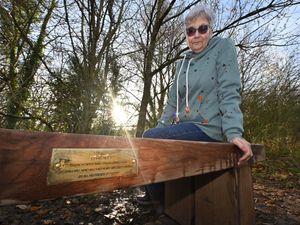Telford prisoner death inquest hears of delay
A coroner has heard how it took prison staff 15 minutes to get to a dying inmate because they did not have the right tool to break into his barricaded cell.
Christopher Moss's inquest also heard how the 51-year-old, from Telford, had asked to be moved to be moved to a segregation unit at HMP Featherstone for his own safety.
The inquest recorded a conclusion of suicide, and heard how the father-of-four had reported to staff at the Category C prison that he was being threatened by other prisoners.
In light of the findings the Senior Coroner for Staffordshire South, Andrew Haigh, will send a 'report to prevent future deaths' to the Ministry of Justice to ensure that prisons across the country have the correct equipment to access cells when doors have been barricaded.
The Ministry of Justice has said it will assess the coroner's findings to see if further action should be taken.
A spokesman said: "Our thoughts are with the family and friends of Mr Moss.
"We will now carefully consider the inquest findings and take further action where necessary.”
Mr Moss' family said they had been concerned about his safety for more than two years.
His daughter Rachel said: “Dad recognised he had to serve his punishment for doing wrong previously. He had maintained a trusted position and was being released on temporary licence to work in the prison visits centre, outside the prison grounds, each day.
“He had passed a major milestone in his sentence and had less than a year to serve. He was optimistic about returning home to be near his family and that is why his death was such a shock for us all.
“For more than two years our family have had a number of concerns about what happened to dad, particularly as previous official reports had been critical of the high levels of violence and intimidation that existed in the prison.
“While nothing will bring dad back we are grateful that the inquest has now answered many of the questions our family had.
“Although people are in prison for their own actions prisons still have a duty of care to ensure the safety of those under their supervision. We hope that the inquest findings reinforce the importance of the need for safety standards to be upheld at all times, and that lessons will be learned from what happened to dad.”
Mr Moss was pronounced dead on February 18, 2017, after staff at the prison forced their way into his cell shortly after finding him with a cut to his forehead.
The jury inquest concluded that Mr Moss died as a result of suicide and that this may have been caused by threats made to him.
The inquest heard that, after calling for medical assistance and being seen by a prison officer, her had barricaded himself in his cell.
Threats
It took prison staff around 15 minutes to access the cell, by which time he had died as a result of a self-inflicted cut.
The inquest heard that once prison staff had identified and located the right tool to use to get in to the cell – a 'hooley bar' – they were able to access it within seconds.
Oliver Carter, a specialist public law and human rights lawyer at Irwin Mitchell representing the family, said: “In 2017 HM Chief Inspector of Prisons published a report into HMP Featherstone which was critical of the very high levels of violence and intimidation within the prison.
"Christopher was described by a number of staff as a 'model prisoner', but the jury heard that he had reported threats from other prisoners who were reportedly pressuring him to bring drugs into the prison from the visits centre.
"On the days before his death, Christopher spoke to prison staff a number of times about these threats, and asked to move to the segregation unit for his own safety. Sadly, this request was declined. There was also a delay in accessing Christopher's cell after medical assistance was called for, during which there may have been an opportunity to save his life.
“Since Christopher’s death, his family have had concerns about whether the problems with safety and violence at HMP Featherstone may have been a factor in his unexpected death. They hope that lessons will be learned from this tragic case.”
Anita Sharma, Senior Caseworker at INQUEST said: “Christopher’s death may have been prevented had the prison responded to his fears for his safety and reported bullying. The high levels of violence across the prison estate has been reported and documented for a number of years yet we continue to see the same failings time and again. The government's rhetoric on improving prison safety is clearly not working.
"Quick fixes have not worked. Bold and decisive action is needed to tackle sentencing policy, reduce the prison population and redirect resources to community services. This is the only way to stem the rising toll of deaths, self-harm and violence.”




